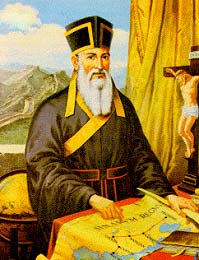
-- St. Francis de Sales (AD 1567-1622), "the Gentleman Saint," was born of a wealthy family in Savoy, but turned from a promising career in law to become a priest and then a bishop. As the bishop of Geneva, one of his chief accomplishments was the courageous (and very successful) evangelization in the heart of Calvinist France. Because I highly admire his tenderness, devotion to holiness in every area of life, and his saintly patronage of (January 24) writers, journalists and teachers, I have found him as my patron saint upon my chrismation into the Catholic Church -- and as my companion on the Way. (Learn more from CCEL and check out his works at Amazon.com.)
Other of FCA's Patrons and Heroes

-- St. Innocent (Veniaminov) of Irkutsk (AD 1797-1879), co-patron saint of FCA. Veniaminov, canonized as the Apostle to America, is a hero of foreign missions (esp. in Aleut Alaska and North America) fueled by grace, sheer human strength and skill, courage, sacrifice and a masterful immersion in foreign languages and cultures.


-- Sts. Cyril & Methodius (AD 827-869 & 826-885), "the Apostles of the Slavs," were born in Thessalonika into a senatorial family, but they renounced their prestigious political inheritance to become monastic priests on the Bosphorus. In 863, after successful mission service among the Khazars, the brothers served among the Moravians as translators and pastors for more than four years, although they were criticized by the earlier German missionaries there for their use of the vernacular in the liturgy. Happily, when they sought papal support in Rome, the brothers were received warmly by Pope Adrian II, who not only returned them to the Moravians, but also sanctioned their Slavonic liturgy (based on Cyril's now-standard alphabetization of the Slavonic language). Unhappily, however, Cyril died in Rome and Methodius returned alone to Moravia. Adrian II created a Moravian archdiocese and appointed Methodius as its archbishop. In 870 he was deposed and imprisoned for three years by King Louis and the ever-antagonistic Germans -- until Pope John VIII exonerated him and reinstated him as archbishop. Methodius received constant support from Pope John VIII against his relentless opponent, Wiching, a German priest. These brothers, hose Latin feast day is February 14, are the patrons of missions, of Europe, and of the (re)union of the East and the West in the Church -- all things which are deep in my heart.

-- St. Leopoldo Mandic (AD 1866-1942) was born the twelfth child of a noble family in Dalmatia (now-western Bosnia) and was ordained a friar of the strict Capuchin order in 1890. Despite his intense desire for missions in eastern Europe, Leopoldo's physical frailty and poor speech led his superiors to keep him in Padua, Italy, where stayed the rest of his life. Undaunted by confinement to one city, St. Leopoldo became a "martyr of the confessional", welcoming, counseling, healing and absolving countless penitents. Because of his intense desire for Eastern-Western Church reunion and his radical apostolate of Penance, Leopoldo is known as the Apostle of Unity and Reconciliation. His feast day is July 30.

-- Matteo Ricci (AD 1552-1610), missionary to China and master scientist. Against the wishes of his very anti-religious father, Ricci entered the Society of Jesus in 1571. In 1583 he was sent to China, where he remained for the next 27 years, serving as a highly respected scientific, theological and linguistic scholar. His vast learning, humble nature and almost flawless adaptation to Chinese culture won him the ability to evangelize China's ruling elite. Though not a saint, Ricci typifies for me the Jesuit willingness to "become all things to all people," as well as the Jesuit courage of faith to embrace God's truth both in science and revelation.
-- Bishop Oscar Arnulfo Romero (AD 1917-1980), a Jesuit, was the Archbishop of San Salvador, El Salvador until his assassination in 1980 while he was celebrating the Mass. Romero bridged a gap between the Marxist revoultionaries inciting poor Salvadorians and the wealthy aristocrats oppressing them, Romero's flock, with the national army.
(Icon by Robert Lentz)


-- Fr. Stanley L. Jaki, OSB (AD 1924--), holds doctorates in both theology and physics. The Hungarian-born priest moved to the USA in the 1950s where he then completed a PhD in theoretical physics at Fordham University. Since then, he has been a prolific lecturer and writer, particularly concerning the history of science and its surprisingly intimate connections to the Catholic worldview. Unquestionably on the pugnacious side, Jaki's witness, like that of most prophets, "hurts so good": his writings are historically dense and tightly argued and his staunch commitment to the Catholic Church of Christ is leaves no quarter for vapid secularism, much less for vapid theism. Unfortunately, many of his works are usually very hard to find and most popular science authors, to their shame, simply seem to have no idea about Jaki's significant contributions (which is odd, considering his many prestigious accolades and lengthy CV). If ever there were a thinker who's time has not yet come, it is Jaki. Also an astute ecclesiologist and a leading Newmanist, Fr. Jaki is a hero of sorts for me, not only because he models academic and spiritual excellence in the examination of science, history and faith, but also because his book, The Savior of Science, played no small role in my entry into the Church.

No comments:
Post a Comment